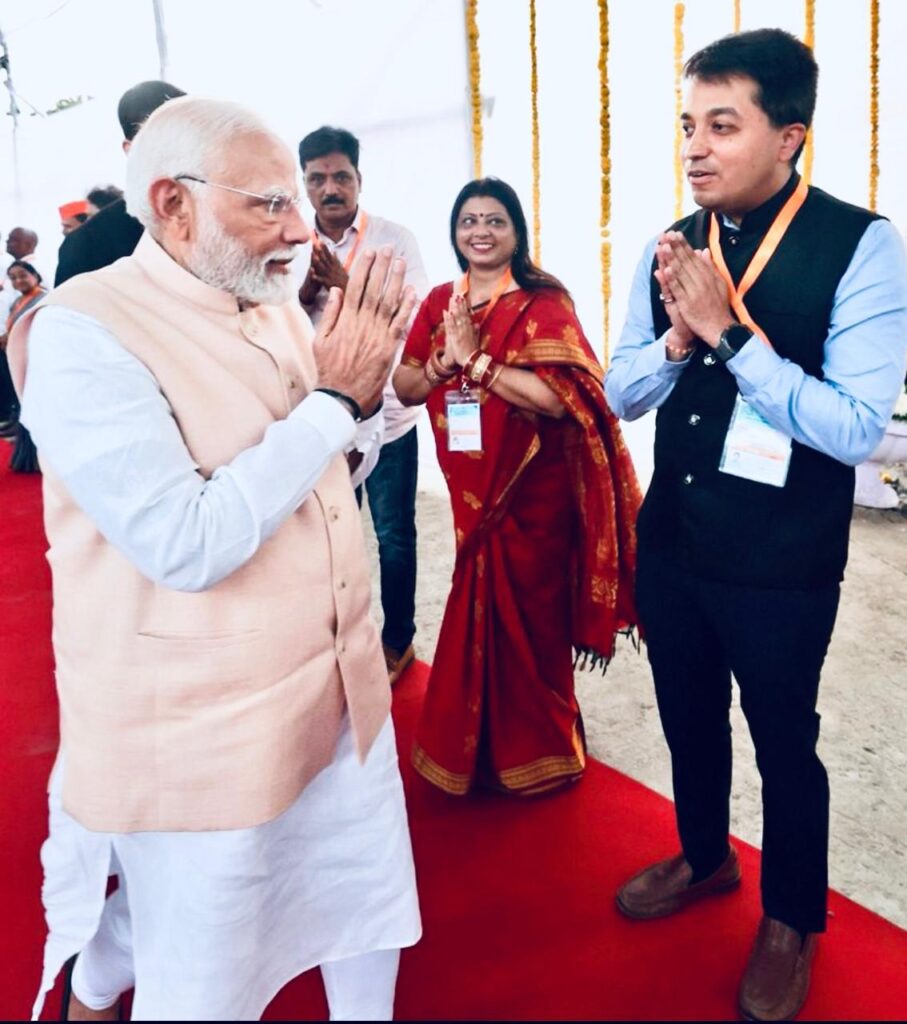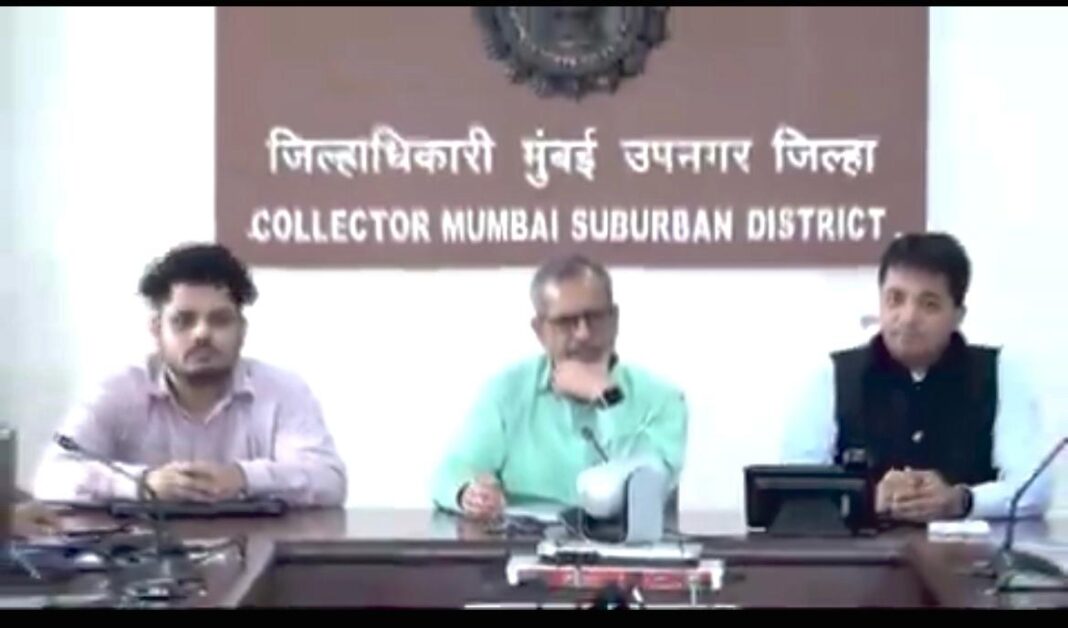X: @vivekbhavsar
Devang Dave, a dedicated young BJP party worker, has played a pivotal role in addressing more than 4 lakh grievances from the public out of a total of 6 lakh, within the last two months. Taking the initiative to ensure the Mahayuti government’s policy decisions reached the common man, he personally visited all 36 districts, including Mumbai City and Mumbai Suburban.
He met with district collectors and key officials to understand the reasons for delays and worked toward resolving them. Devang’s efforts were supported by Sujata Saunik, Maharashtra’s first female Chief Secretary, who is known for her strict administrative approach and commitment to reforms. Upon taking office, she discovered a significant backlog of complaints related to government policy implementation at the district level. Despite her regular video conferences to address the issue, additional intervention was necessary.

Devang stepped in at this crucial time, leveraging his rapport with Sujata Saunik. He initially posed a challenge in gaining the cooperation of senior district officials. However, with clear directives from the Chief Secretary, he was able to facilitate meetings with administrative heads such as district collectors, Zilla Parishad CEOs, and municipal officers.
Over the course of two months, Devang relentlessly traveled across Maharashtra, reviewing the status of government schemes and expediting the resolution of complaints. This proactive approach has been a significant step in ensuring effective governance at the grassroots level.

During his district visits, Devang Dave focused on grievances related to the implementation of government schemes that had been delayed or poorly executed. The complaints ranged from issues concerning land disputes, delays in welfare benefits, infrastructure deficiencies, and problems with public services. By meeting with district officials and understanding their challenges, Devang identified bottlenecks in the system and proposed practical solutions.
His approach was hands-on—he didn’t merely rely on reports but also engaged directly with local administrators, ensuring they understood the urgency of addressing these grievances. This ground-level involvement helped create accountability within the district administration, as many officials realised that these issues were being closely monitored not only by the Chief Secretary but also by a representative of the ruling party.
Devang’s young age and lack of formal administrative authority could have been a barrier, but his deep commitment and knowledge of BJP’s policies, along with Sujata Saunik’s backing, helped him navigate the bureaucratic system. His work is seen as an example of how political and administrative collaboration can drive efficiency in government functioning, ultimately benefiting the common man. In addition to resolving specific complaints, Devang’s visits have highlighted the importance of creating a more responsive administrative culture. His interactions with district officials have reinforced the need for regular review and follow-ups, reducing the likelihood of future backlogs.
Also Read: Utilise ballot boxes in rural area until sufficient EVMs be available
As Maharashtra continues to implement various welfare schemes, the partnership between Devang Dave’s proactive approach and Sujata Saunik’s administrative rigor may serve as a model for other states, ensuring that government schemes truly reach those they are intended to serve. Through this initiative, Devang has proven that youth leadership, when combined with administrative cooperation, can bring about meaningful change at the grassroots level.
Devang Dave’s initiative also fostered a stronger connection between the government and the public, as his visits allowed citizens to see that their grievances were being actively addressed. This effort has improved public trust in the administration, especially in rural and semi-urban areas where grievances often remain unheard or unresolved for extended periods.

One of the standout aspects of his work has been the speed at which he was able to act. Within two months, the resolution of over 4 lakh grievances shows a significant reduction in the backlog that had accumulated over time. Devang’s dedication to following up on each case, and his close coordination with district officials, enabled a streamlined process where complaints were not just logged but resolved. This demonstrated the government’s commitment to efficiency and accountability.
By tackling long-pending grievances, Devang’s work helped bring relief to thousands of families who had been waiting for solutions to problems like land ownership disputes, delays in pension disbursements, ration card issues, and access to healthcare and education services. This not only helped individuals but also strengthened the larger social fabric by addressing systemic issues in governance.
Moreover, his efforts have highlighted the importance of collaboration between political workers and the bureaucracy. Devang’s understanding of local issues, coupled with Sujata Saunik’s administrative authority, created a balanced approach where the political will to help people translated into actionable results. This partnership sent a message to other districts that, with the right synergy between government officials and proactive citizens, administrative obstacles can be overcome.
Devang’s success in resolving grievances has also positioned him as an emerging leader within the BJP, particularly among the younger generation. His work reflects the party’s focus on governance and public service, and it serves as an example of how younger party members can contribute meaningfully to the functioning of government. His efforts are being seen not only as an accomplishment for the party but also as a step toward nurturing the next generation of political leaders who prioritise public welfare over politics.
Looking ahead, Devang’s model of direct intervention and close cooperation with district administrations could potentially be replicated in other states facing similar backlogs. His ability to balance political advocacy with administrative coordination sets a precedent for future public policy initiatives that aim to bridge the gap between the government and the people.
In the long run, this initiative may inspire other youth leaders within the party and beyond to take up similar roles in addressing local governance issues, thereby driving a culture of responsiveness and accountability that extends across the state and, eventually, the country.








where can i buy cheap clomid no prescription good rx clomid can you get cheap clomid without a prescription where to buy cheap clomid no prescription how can i get cheap clomiphene price where can i get clomid tablets clomid buy
Greetings! Utter gainful par‘nesis within this article! It’s the petty changes which choice make the largest changes. Thanks a lot for sharing!
I’ll certainly bring back to skim more.
cost rybelsus – buy semaglutide for sale periactin 4mg tablet
clavulanate ca – https://atbioinfo.com/ acillin over the counter
nexium canada – https://anexamate.com/ cost nexium
mobic 15mg without prescription – mobo sin mobic 15mg without prescription
deltasone 10mg cost – aprep lson buy prednisone pills
where to buy ed pills – https://fastedtotake.com/ mens ed pills
amoxil cost – https://combamoxi.com/ buy amoxicillin sale
oral cenforce 100mg – cenforce 100mg brand order cenforce 100mg generic
tadalafil 40 mg with dapoxetine 60 mg – this cialis 20 mg price walgreens
buy cialis no prescription overnight – https://strongtadafl.com/ buy cialis online in austalia
100 mg viagra – buy viagra uk paypal 50mg viagra price
This is a question which is forthcoming to my verve… Myriad thanks! Exactly where can I notice the acquaintance details due to the fact that questions? cenforce 100 espaГ±ol
This is the kind of post I turn up helpful. azithromycin where to buy
I’ll certainly bring back to review more. https://ursxdol.com/synthroid-available-online/
Thanks for sharing. It’s top quality. https://ondactone.com/spironolactone/
Thanks on putting this up. It’s evidently done.
buy lioresal pill
The thoroughness in this draft is noteworthy. http://www.zgqsz.com/home.php?mod=space&uid=847629
brand dapagliflozin 10mg – https://janozin.com/# dapagliflozin 10mg ca
xenical over the counter – https://asacostat.com/ order orlistat 60mg pill
This website really has all of the bumf and facts I needed there this case and didn’t know who to ask. http://zqykj.cn/bbs/home.php?mod=space&uid=303437
You can keep yourself and your dearest by being alert when buying pharmaceutical online. Some druggist’s websites control legally and put forward convenience, secretiveness, bring in savings and safeguards for purchasing medicines. buy in TerbinaPharmacy https://terbinafines.com/product/robaxin.html robaxin
The depth in this piece is exceptional.
Tham gia cộng đồng game thủ tại Go88 để trải nghiệm các trò chơi bài, poker phổ biến nhất hiện nay.
kuwin sở hữu kho game đa dạng từ slot đến trò chơi bài đổi thưởng, mang đến cho bạn những giây phút giải trí tuyệt vời.
专业构建与管理谷歌站群网络,助力品牌实现全域流量的强势增长。谷歌站群
Tham gia cộng đồng game thủ tại Go88 để trải nghiệm các trò chơi bài, poker phổ biến nhất hiện nay.
Với giao diện mượt mà và ưu đãi hấp dẫn, MM88 là lựa chọn lý tưởng cho các tín đồ giải trí trực tuyến.
mgm on line online casino betmgm play betmgm sportsbook promo
Dive into the world of professional gambling. In crowns coin casino, live dealers and a mobile version are available. Win with comfort!
Sweet Bonanza brings the candy shop to life with high-stakes tumbling action. Multipliers sweet bonanza max win up to 100x make every bonus round epic. Get your sugar fix!